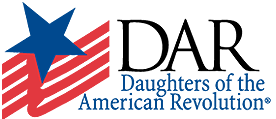
About the National Society of the Daughters of the American Revolution (DAR)
The National Society Daughters of the American Revolution was founded on October 11, 1890 during a period of national patriotism and intense interest in early U.S history. A group of pioneering women in Washington D.C., frustrated by their exclusion from men's patriotic organizations, formed the Daughters of the American Revolution to perpetuate the memory of ancestors who fought to make this country free and independent. Membership in the DAR is open to women who can document bloodline descent from someone (man or woman) who supported the cause of liberty during the Revolutionary War, either by fighting, feeding the troops, supplying goods or money, or serving in the United States government. Current membership is approximately 185,000 women in 3000 state chapters.
 DAR Headquarters and Museum, Washington, D.C.
DAR Headquarters and Museum, Washington, D.C.
The DAR Museum was founded at the same time as its parent organization with the goals of collecting, preserving, exhibiting, and interpreting the material culture and social history of pre-industrial America. From the beginning DAR members wanted to "study the manners and measures of those days….[and] preserve some record of the heroic deeds of American women." The DAR Museum's collections include over 30,000 objects reflecting American material culture and social history of the 18th and 19th centuries. Collection strengths include decorative arts, costumes, quilts, and needlework, with many objects finding a home in the DAR Museum long before other museums began to recognize their value.
About the DAR Sampler Collection
The DAR Museum has more than 350 samplers and related girlhood embroideries in its collection, of which approximately 325 have a documented American provenance. Many of the samplers in the collection were donated to the museum by DAR members across the country and by DAR state chapters. Because of this, the sampler maker's name, family genealogy, and regional history are often known. This information has been expanded through extensive research by museum curators. The DAR Museum was one of three pilot sites during Phase 1 of the Sampler Archive Project, helping project staff to develop documentation procedures and guidelines. The Sampler Archive database currently includes 101 of the DAR's American samplers and pictorial embroideries, stitched over a period of 110 years - 1759 to 1869.
Click to browse the objects contributed by the DAR Museum.
Contacts and Permissions

The DAR Museum holds the copyright for its images in the Sampler Archive database. Feel free to use the images for personal research and education.
DAR works hard to make the collection accessible to all. For further information about an object or to make an appointment to see an object or group of objects please email [email protected] or call 202.628.1776.

